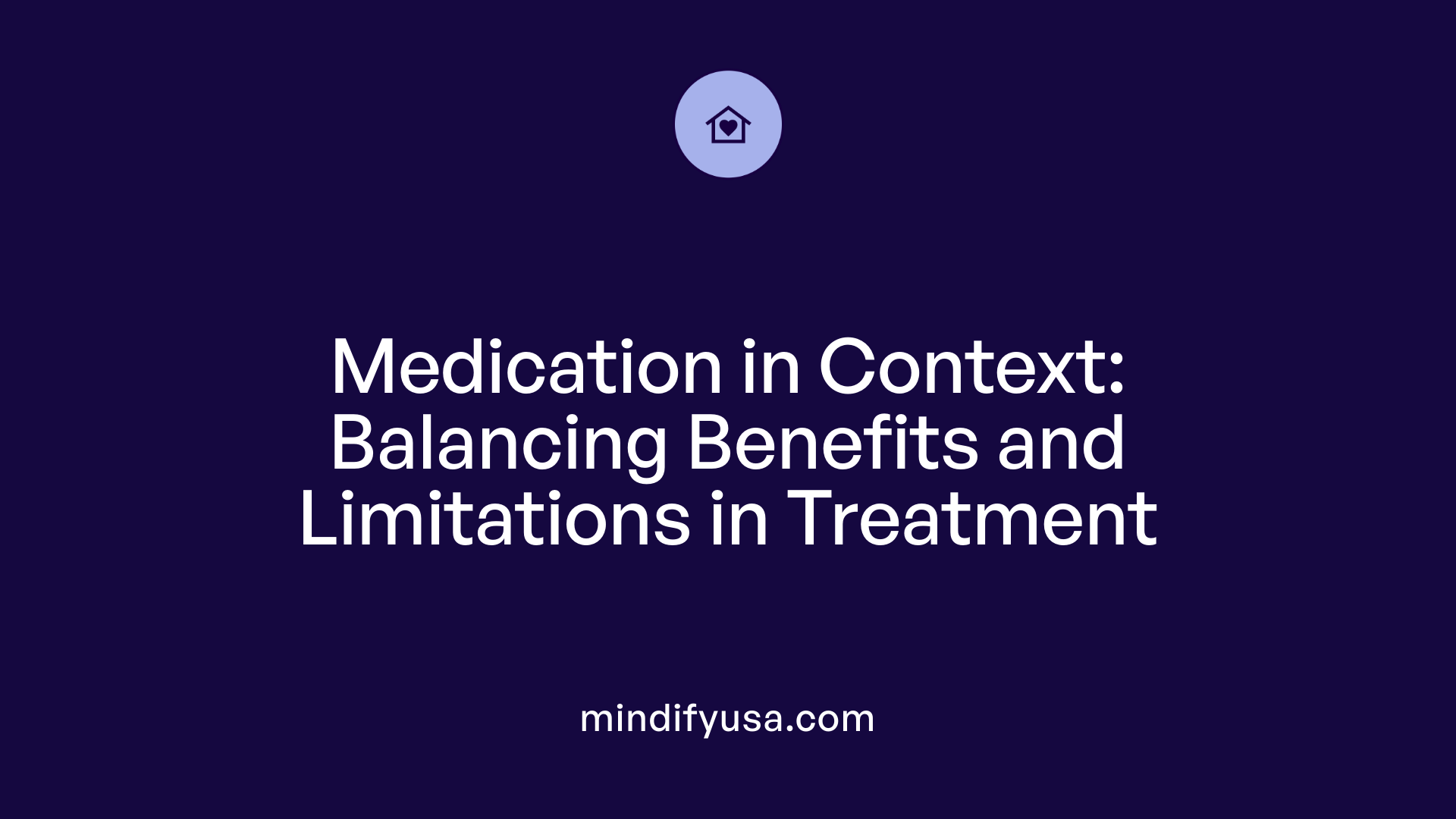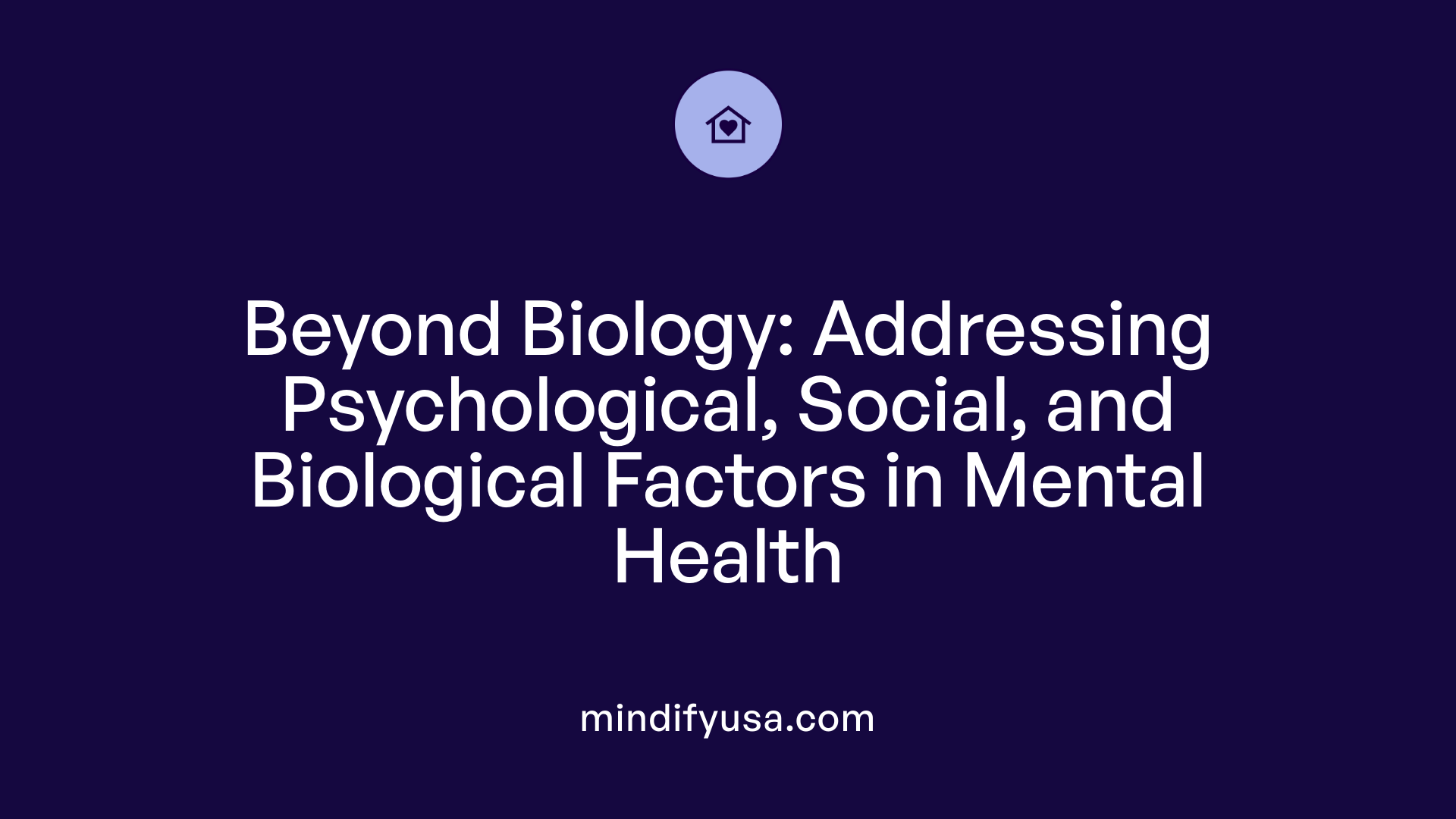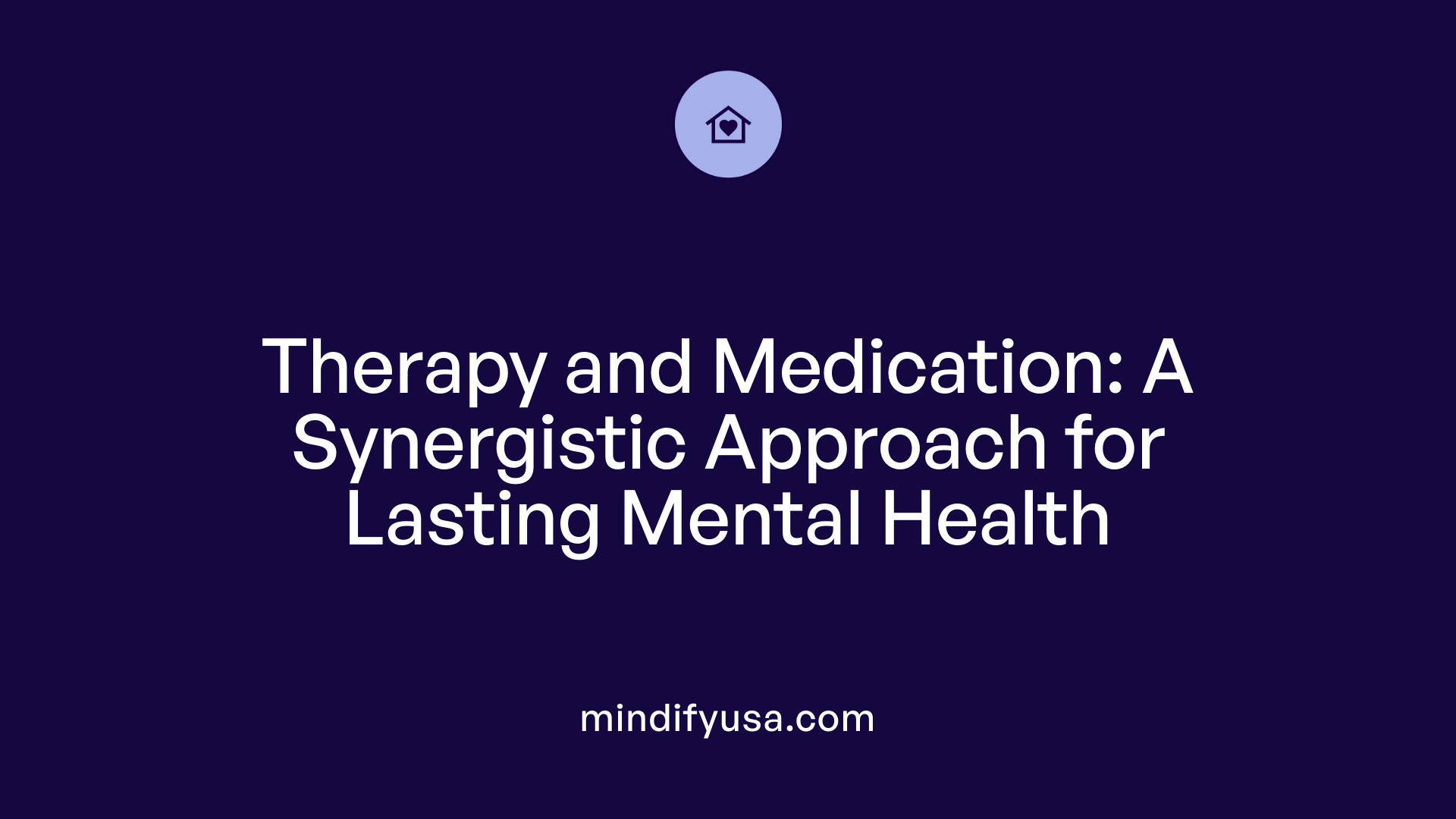Understanding the Need for a Multifaceted Approach
Psychiatric medications have revolutionized mental health treatment by offering rapid symptom relief and helping many regain functional stability. However, relying solely on medication often falls short of achieving lasting recovery. The complex nature of psychiatric conditions—shaped by biological, psychological, and social factors—necessitates a comprehensive treatment strategy. This article explores why medication alone may not resolve psychiatric symptoms and emphasizes the importance of integrating therapy, lifestyle interventions, and personalized care.
The Role and Limitations of Psychiatric Medications

What are common psychiatric drugs, and what are their potential long-term side effects?
Common psychiatric medications include several classes tailored to specific mental health conditions. Antidepressants, such as selective serotonin reuptake inhibitors (SSRIs) and serotonin-norepinephrine reuptake inhibitors (SNRIs), are widely prescribed for depression and anxiety. Antipsychotics, both first- and second-generation, manage psychosis and mood disorders. Mood stabilizers like lithium are used for bipolar disorder, while benzodiazepines serve as anti-anxiety medications. Stimulants are prescribed for attention-deficit/hyperactivity disorder (ADHD).
While these medications are effective, long-term use can be associated with side effects. Common issues include weight gain, metabolic changes that increase cardiovascular risk, and movement disorders like tardive dyskinesia. Hormonal imbalances, such as elevated prolactin levels, may also occur. Serious but infrequent side effects include heart problems, severe allergic reactions, and neurological symptoms such as seizures. Individual responses vary, making ongoing monitoring by healthcare providers essential. Patients should have open discussions with their physicians about the risks and benefits, and promptly report any adverse effects.
| Medication Class | Common Drugs | Long-term Side Effects | Additional Notes |
|---|---|---|---|
| Antidepressants | SSRIs, SNRIs | Weight changes, sexual dysfunction, serotonin syndrome risk | Effects may take weeks to appear, require careful monitoring |
| Antipsychotics | Conventional, atypical agents | Tardive dyskinesia, metabolic syndrome, hormonal issues | Some newer agents have fewer metabolic side effects |
| Mood Stabilizers | Lithium | Kidney toxicity, thyroid issues | Blood level monitoring required |
| Anti-anxiety | Benzodiazepines | Dependence, tolerance, cognitive impairment | Risk of withdrawal symptoms upon discontinuation |
| Stimulants | Amphetamines, methylphenidate | Insomnia, increased heart rate, potential for dependency | Used cautiously, especially in young children |
What are the benefits and limitations of using medication for mental health issues?
Medications can significantly improve quality of life by alleviating symptoms such as persistent sadness, extreme anxiety, hallucinations, or mood swings. They work by adjusting neurotransmitter levels in the brain, helping to restore emotional balance. When combined with psychotherapy, medications can lead to faster symptom control and better functional outcomes.
However, medications come with limitations. Not all individuals respond positively, and effectiveness varies. Onset of benefits may be delayed, sometimes taking several weeks. Side effects are common and can include weight gain, fatigue, sexual dysfunction, or more severe reactions that require medical attention.
Reliance solely on medication risks dependency, especially with drugs like benzodiazepines. Moreover, medications often address symptoms temporarily without tackling the underlying psychological or environmental causes. They also do not teach coping skills, which are crucial for long-term resilience. Regular medical oversight is necessary to manage adverse effects and adjust treatment plans.
| Pros of Medication | Cons of Medication | Important Considerations |
|---|---|---|
| Effective for many | Variable response | Ongoing monitoring needed |
| Reduces symptoms | Side effects risk | Not a standalone treatment |
| Can stabilize mood | Dependency potential | Should be used with therapy |
| Rapid symptom relief | Withdrawal concerns | Personalized treatment plans |
What should be done if psychiatric medications do not seem to work?
When medications do not produce the expected improvements, a multi-faceted approach is required. First, clinicians should verify proper diagnosis and ensure adherence to prescribed regimens. It might involve adjusting dosages or switching to different medications or classes.
Augmentation strategies, such as adding lithium for depression or utilizing second-generation antipsychotics, can help. Psychotherapy, especially cognitive-behavioral therapy (CBT), often enhances treatment response by addressing underlying thought patterns and behaviors.
For treatment-resistant cases, somatic therapies like electroconvulsive therapy (ECT) or transcranial magnetic stimulation (TMS) are viable options. Emerging treatments include ketamine infusions, which show promise for resistant depression. Advanced interventions, like vagus nerve stimulation or deep brain stimulation, are considered in severe, otherwise intractable cases.
Personalized treatment plans that include ongoing reassessment and incorporation of new therapies are critical. Collaboration among mental health professionals ensures that each individual receives tailored care aimed at optimal recovery.
| Approach Type | Common Strategies | When to Consider |
|---|---|---|
| Medication adjustments | Dose escalation, switching drugs | No response after 4-6 weeks |
| Augmentation and combination | Adding other medications like lithium or antipsychotics | Partial response to initial meds |
| Psychological therapies | CBT, interpersonal therapy | To address underlying issues |
| Somatic treatments | ECT, TMS, ketamine | Severe or treatment-resistant cases |
| Innovative options | Vagus nerve stimulation, deep brain stimulation | Last-resort options |
This comprehensive approach underscores the importance of personalized, adaptive care in effectively managing mental health conditions that are unresponsive to initial medication strategies.
Understanding the Psychological and Biological Components of Psychiatric Conditions

Why might medication alone be insufficient in treating mental health conditions?
Medication can be effective in alleviating specific physiological symptoms associated with mental health disorders, such as reducing racing thoughts, stabilizing mood, or improving sleep. However, relying solely on medication does not address the full complexity of mental health conditions. Many psychiatric issues are rooted in a combination of biological, psychological, and social factors.
For instance, medication primarily targets neurochemical imbalances, such as serotonin or dopamine levels, effectively managing symptoms like depression or anxiety. Yet, it doesn't resolve underlying issues like negative thought patterns, past traumas, behavioral habits, or environmental stressors. These factors often sustain or exacerbate mental health problems over time.
To achieve meaningful and lasting recovery, a comprehensive treatment approach is needed. The Collaborative Care Model (CoCM) exemplifies this by combining medication with evidence-based therapies, such as cognitive-behavioral therapy (CBT), care management, and psychiatric consultation. This integrated framework ensures ongoing assessment and adjustment of treatment plans based on individual progress.
Measurement-based care within CoCM involves regular monitoring of symptoms and functioning, allowing clinicians to tailor interventions dynamically. By doing so, the treatment addresses not only physiological symptoms but also the emotional, behavioral, and social aspects of conditions.
Furthermore, social determinants like relationships, work environment, and lifestyle play significant roles in mental health. Incorporating support systems and lifestyle modifications into treatment enhances resilience and promotes sustainable well-being.
In summary, medication alone often falls short because it is limited to symptom management. A multifaceted approach that combines medication with psychotherapeutic interventions, systemic support models, and lifestyle considerations is essential for effective, long-term mental health care. This integrated strategy not only addresses the biological components but also tackles the underlying psychological and social contributors, fostering deeper healing and healthier functioning.
The Significance of Therapy in Long-Term Mental Health Management

How do therapy and medication work together in mental health treatment?
In mental health care, combining therapy with medication offers a comprehensive approach that targets both the physical and emotional roots of mental health issues. Medications are effective at rapidly alleviating physiological symptoms, such as mood swings, excessive worries, or intrusive thoughts, by balancing neurotransmitters and stabilizing brain chemistry. This stabilization creates a mental space that allows individuals to participate actively in therapy.
Therapy, particularly modalities like cognitive-behavioral therapy (CBT), delves into the underlying causes of anxiety, depression, or other conditions. It helps identify distorted thought patterns, long-standing behavioral habits, and past experiences that perpetuate suffering. Through therapeutic techniques, individuals gain strategies for emotional regulation, problem-solving, and stress management.
When used together, medication and therapy reinforce each other’s benefits. Medication can hasten symptom relief, making difficult emotions or thoughts more manageable. This enables patients to engage more effectively in therapy, learning and practicing new skills. Conversely, therapy provides long-term benefits by equipping individuals with coping mechanisms that are sustainable even after medication is discontinued.
This integrated approach promotes quicker recovery, improved daily functioning, and greater resilience. It also lowers the risk of relapse, particularly in complex or recurrent mental health conditions. For severe cases, combining these treatments ensures a more balanced and personalized care plan, addressing immediate symptoms and deeper psychological issues.
Types of therapy and their benefits (e.g., CBT)
Cognitive-behavioral therapy (CBT) is one of the most widely used and effective psychotherapy approaches for anxiety, depression, and other disorders. It focuses on changing negative thought patterns and behaviors that fuel mental health challenges. Through structured sessions, individuals learn skills such as cognitive restructuring, relaxation techniques, and exposure exercises, which help reduce symptoms over time.
Other therapeutic modalities include interpersonal therapy, psychodynamic therapy, mindfulness-based therapies, and behavioral activation. Each offers unique benefits tailored to individual needs, addressing specific emotional, psychological, or behavioral components.
For example, psychodynamic therapy explores unconscious conflicts rooted in past experiences, while mindfulness-based therapies promote present-moment awareness to manage stress. Behavioral activation helps combat inactivity and feelings of emptiness by encouraging engagement in meaningful activities.
Synergy between therapy and medication
The combination of therapy and medication often results in superior outcomes compared to either approach alone, especially for conditions like depression and anxiety.
Medications can quickly reduce acute symptoms, allowing individuals to participate more fully in therapy sessions. This initial stabilization can accelerate the learning of coping skills, emotional regulation, and cognitive restructuring.
Simultaneously, therapy tends to produce more enduring improvements by addressing root causes, beliefs, and behavioral habits. These skills can prevent relapse and improve overall quality of life.
In some cases, especially with severe or recurrent disorders, medication may serve as a necessary tool to manage symptoms while therapy tackles underlying psychological issues. Moreover, working with a therapist can help manage medication side effects and support adherence, ensuring safe and effective treatment.
Impact on long-term well-being
Engaging in therapy helps build resilience, emotional strength, and self-awareness. These qualities enable individuals to handle future stressors and challenging situations more effectively.
Importantly, therapy empowers individuals to take an active role in their recovery journey, fostering independence and self-reliance. It also addresses broader life challenges, such as relationship difficulties or lifestyle factors like sleep and nutrition, which influence mental health.
Overall, the synergy between medication and therapy creates a personalized, adaptable treatment plan. This approach does not only target symptoms but also promotes sustained mental health management, reducing the likelihood of relapse and supporting enduring well-being.
| Aspect | Main Focus | Benefits | Additional Notes |
|---|---|---|---|
| Medication | Targets physiological symptoms | Rapid relief, symptom stabilization | May cause side effects or dependency; not addressing root causes |
| Therapy | Explores emotional and psychological roots | Long-term skills, resilience, relapse prevention | Enhances medication effects; fosters self-awareness |
| Combined Approach | Integrates both treatment forms | Faster recovery, durable improvements, higher satisfaction | Requires collaboration with healthcare providers |
This integrated treatment strategy recognizes that mental health conditions are complex, involving biological, emotional, and behavioral components. Tailoring interventions to individual needs maximizes the chances for lasting recovery and improved quality of life.
The Critical Role of Personalized and Systematic Treatment Planning

What factors influence the effectiveness of psychiatric treatment?
Several elements play a crucial role in determining how well psychiatric treatment works for an individual. First, an accurate diagnosis forms the foundation, ensuring that the right treatment approach is chosen. Appropriate medication selection, tailored to the patient's specific condition and biology, significantly impacts outcomes.
Therapeutic relationships are vital; a strong alliance between the clinician and the patient fosters trust, openness, and adherence to treatment plans. Patient adherence is essential—recognizing and managing side effects, reducing stigma, and addressing financial barriers help promote consistent engagement.
External support systems such as family, community resources, and culturally sensitive care enhance motivation and accountability. These factors create a supportive environment that encourages ongoing participation in treatment.
Individual differences also influence success. Motivation levels, insight into one's condition, and responsiveness to therapies vary widely. Additionally, holistic factors like lifestyle choices, physical health, sleep patterns, nutrition, and readiness for change further modulate treatment effectiveness.
In summary, personalized approaches that integrate medical, psychological, social, and cultural considerations generally lead to better outcomes. Tailoring treatment plans to the unique needs and circumstances of each person ensures that care is both effective and sustainable.
Factors influencing treatment success
| Factor | Explanation | Impact on Outcomes |
|---|---|---|
| Accurate Diagnosis | Precise identification of mental health conditions | Ensures appropriate treatment choices |
| Proper Medication Choice | Selecting medications based on individual biology and symptoms | Improves symptom control and minimizes side effects |
| Therapeutic Alliance | Quality of relationship between patient and clinician | Enhances trust, engagement, and adherence |
| Patient Adherence | Consistency in following prescribed treatment | Crucial for effectiveness and relapse prevention |
| External Support | Family, community, and cultural support systems | Promotes engagement and continuity of care |
| Individual Differences | Motivation, insight, responsiveness | Influences how well treatment works |
| Lifestyle and Physical Health | Sleep, nutrition, physical activity, and overall well-being | Support mental health and treatment outcomes |
| Readiness for Change | Patient's willingness and preparedness to engage in treatment | Affects progress and sustainability |
Importance of ongoing monitoring and adjustment
Effective psychiatric treatment is not static. Regular assessment allows clinicians to evaluate progress and side effects, ensuring that the chosen treatment continues to meet the patient's evolving needs.
Monitoring involves tracking symptom changes, medication adherence, and the emergence of any adverse effects or new issues. This ongoing process helps identify when adjustments are necessary, such as dosage modifications, switching medications, or integrating additional therapies.
Adjustments are vital because individual responses vary, and circumstances like life changes, physical health status, or social support can alter treatment effectiveness. Systematic evaluation also reinforces patient engagement, making them active participants in their recovery.
By maintaining close collaboration, healthcare providers can optimize treatment plans, improve outcomes, and reduce risks of relapse or adverse effects. This iterative approach underscores that effective mental healthcare is dynamic, personalized, and responsive.
| Aspect | Role in Treatment | Benefits |
|---|---|---|
| Regular Assessments | Periodic reviews of symptoms, side effects, and progress | Enables timely modifications to enhance effectiveness |
| Flexibility in Treatment | Ability to adapt medications and therapies based on feedback and changes | Increases chances of sustained improvement |
| Patient Involvement | Engaging patients in decision-making and feedback process | Improves adherence, satisfaction, and empowerment |
| Documentation and Follow-up | Keeping accurate records of interventions and outcomes | Supports informed adjustments and continuity of care |
In conclusion, integrating ongoing monitoring and flexibility into treatment planning ensures that mental health interventions remain personalized, effective, and capable of addressing the complex and changing nature of psychiatric conditions.
Living Beyond Medication: Managing Lifestyle and Support Systems

How Do Lifestyle Factors Like Sleep, Stress, and Nutrition Influence Anxiety and Mental Health?
Lifestyle choices significantly impact mental health, including anxiety. Poor sleep can exacerbate symptoms, impair emotional regulation, and hinder the effectiveness of therapeutic interventions. Similarly, chronic stress can elevate cortisol levels, which negatively affect brain function and emotional stability.
Nutrition also plays a vital role. A balanced diet rich in essential nutrients supports brain health and can help reduce anxiety symptoms. Conversely, excessive caffeine, sugar, or processed foods may increase feelings of agitation or nervousness.
Key lifestyle factors such as regular exercise, adequate sleep, stress management, and proper nutrition create a foundation for mental wellness. They can enhance the effectiveness of therapy and medication if used as part of a holistic approach.
What Is the Role of Social Support and Community Resources in Mental Health?
Social connections serve as a crucial buffer against anxiety and emotional distress. Support from friends, family, and community groups fosters a sense of safety, belonging, and understanding.
Community resources, including support groups, mental health organizations, and outreach programs, provide additional layers of support. Access to these resources can facilitate ongoing resilience, reduce feelings of isolation, and help individuals navigate challenges.
Engagement with support networks encourages open communication about mental health and promotes adherence to treatment plans. Such community involvement often leads to improved outcomes and sustainable wellbeing.
How Can Self-Awareness and Resilience Be Cultivated?
Building self-awareness involves recognizing personal triggers, thought patterns, and emotional responses. This understanding allows individuals to implement healthier coping strategies and avoid automatic behaviors that may worsen anxiety.
Practicing mindfulness, journaling, and self-reflection helps develop insight into one’s mental state. These practices can reduce rumination and promote emotional regulation.
Resilience—the ability to adapt and recover from stress—is fostered through developing problem-solving skills, maintaining a positive outlook, and setting realistic goals. Engaging in activities that promote confidence and self-efficacy bolsters resilience.
Educational workshops, therapy, and support groups can aid in developing these skills. Such efforts improve long-term mental health by empowering individuals to manage their anxiety proactively, beyond reliance on medication.
An Integrated Approach to Managing Anxiety
A comprehensive mental health strategy combines medication, therapy, and lifestyle modifications. Addressing physical health factors like sleep and diet, bolstering social support, and cultivating resilience all contribute to better outcomes.
This holistic approach minimizes dependency on medications, reduces relapse risks, and promotes sustainable well-being. It recognizes that mental health is affected by complex interactions between biological, psychological, and social factors.
In conclusion, effective anxiety management goes beyond pharmacological solutions. By actively engaging in lifestyle adjustments and foster supportive networks, individuals can build a resilient foundation that supports lasting mental health stability.
| Aspect | Focus | How It Influences Mental Health |
|---|---|---|
| Sleep | Quality and duration | Affects emotional regulation, memory, and stress levels |
| Stress | Management techniques | Lower cortisol, improve mood, reduce anxiety symptoms |
| Nutrition | Balanced diet | Supports neurotransmitter production, improves brain function |
| Social Support | Family, friends, community | Enhances emotional resilience and provides practical help |
| Resilience | Self-awareness, problem-solving | Empowers ongoing management of mental health |
This integrated view helps individuals create a personalized, sustainable plan for anxiety relief, emphasizing that long-term health depends on multiple interconnected factors.
The Path Toward Sustainable Mental Health Recovery
While medication offers vital short-term symptom control, it is merely one element of a successful, long-lasting mental health strategy. Addressing the underlying psychological, social, and lifestyle factors through therapy, personalized care, and systemic support plays an essential role in true recovery. An integrated, multifaceted approach not only alleviates symptoms but also fosters resilience, reduces relapse, and enhances overall well-being. Patients, caregivers, and clinicians should advocate for comprehensive treatment plans that recognize the inherent complexity of psychiatric conditions, ensuring sustainable mental health improvements now and in the future.
References
- Why Medication Alone Does Not Treat Anxiety Disorders
- Mental Health Medications - National Institute of Mental Health (NIMH)
- Mental Health Treatment Fails Without This One Fix
- Understanding Psychiatric Medication | Mental Health Support
- How Do I Choose Between Medication and Therapy?
- Medication | Mental Health America
- Is Psychiatry Medication Management Right for Me? | REACH






































































































